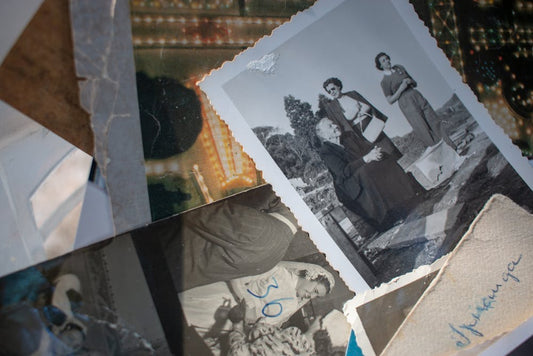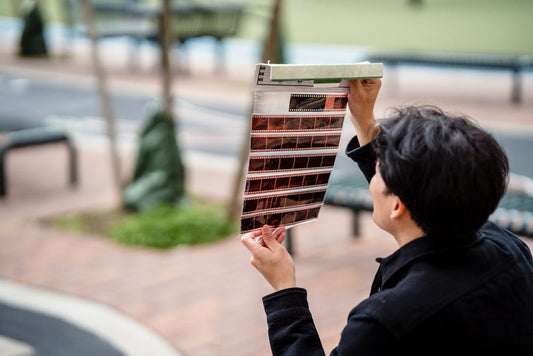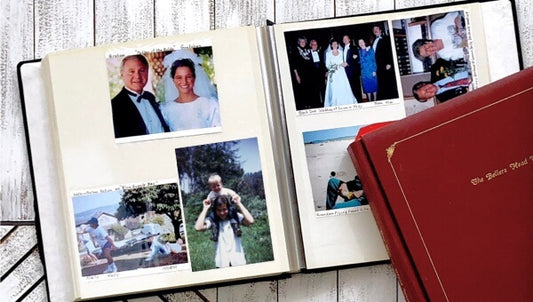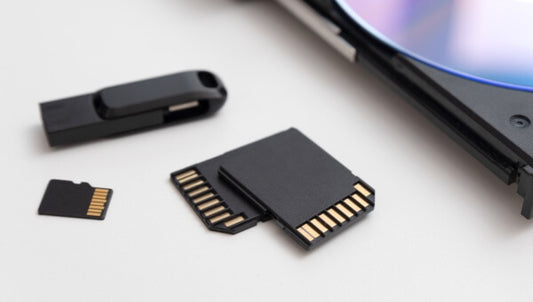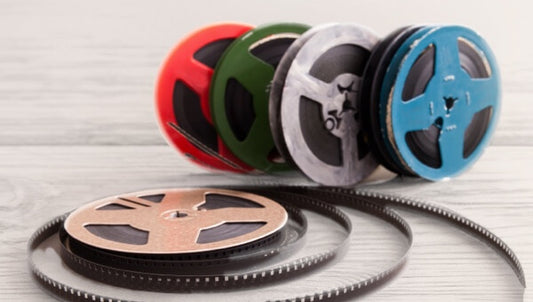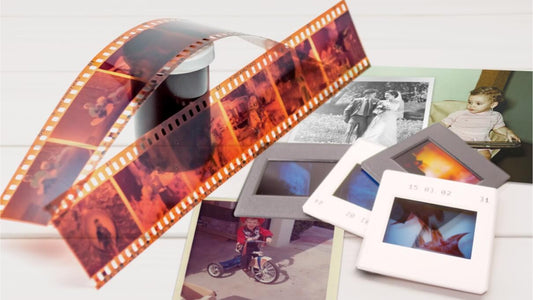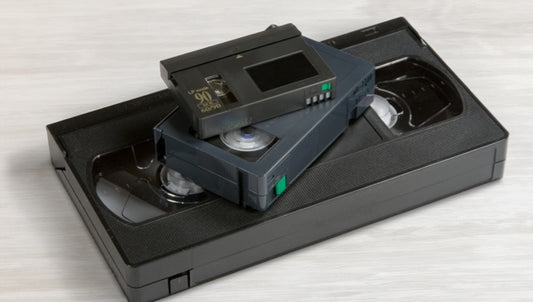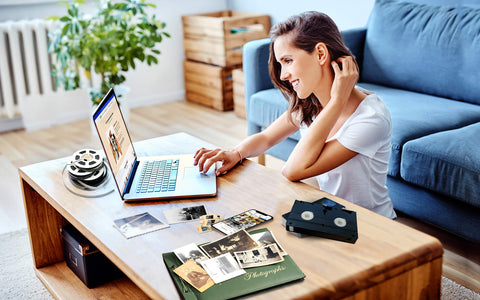With over 20 years of digitizing old photos and film, Capture has seen photographs from a wide range of 1980s cameras. The 80s were a time when high-quality compact cameras and home photography became more affordable, which meant more fun, premium, and memorable cameras to choose from.
While the very first widely used disposable camera was invented in the 80s, many great permanent cameras also captured birthday parties, holidays, and an entire decade or longer full of family memories.
Whether you want to relive your memories, experience nostalgia from another time, purchase a vintage camera, or simply see if your 1980s camera is one of the best, keep reading to learn all about how we chose the top 20 cameras and the features, pros, and cons they offer.
Jump to:
Top 10 Cameras of the 1980s
Top 11-20 Cameras of the 1980s
12. Ricoh FF90 Super
13. Kodak Ektralite
14. Contax RTS
15. Pentax P3
16. Mamiya 645 Pro
17. Rolleiflex SLX
18. Leica M6
19. Cosina CT-1A
20. Disposable Cameras
How We Chose the Top 20 1980s Cameras

Choosing the best of something as subjective as cameras can be difficult, and we admit that there will inevitably be some bias due to nostalgia, preferences, and other factors. However, we did our best to create an objective list using ranking criteria including photo quality, price, popularity, relevance, durability, and features.
Photo Quality
Since the entire purpose of a film camera is to take photos, we had to consider the image quality. One of the main factors for image quality is the shutter speed. While you could get cameras in the 80s with lightning-fast shutter speeds, you would pay more for them. In addition, matrix metering that divides the area of the frame and sets exposure based on subject brightness was available with some 80s cameras. These factors and others influence the image quality of cameras.Price
Affordability is another factor we considered when choosing our top 20 cameras from the 80s. We considered both the release price and the price if you were to purchase the camera today. While most of the cameras on our list weren’t considered budget-friendly cameras, considering the price, features, and quality helped us determine the absolute best vintage 1980s cameras.Popularity and Relevance
Even though our own memories probably influence the cameras we believe are the best, this factor can mitigate some of that influence. The most popular cameras of the 80s may not be the very best without some of the other methodologies like shutter speed and overall photo quality, but we felt that it was important enough to include in our selection criteria.Durability
Not all old cameras were built to last, even if they weren’t technically disposable. Some, however, were designed to withstand a beating and still function. If you were taking your camera on vacation, around children, or just wanted it to last beyond the decade, then you’d want one that was reliable and sturdy.Features
We had to consider the features of the cameras because some offered point-and-shoot capabilities with autofocus, while others featured manual adjustment. In addition, we considered other features like flash, carrying case, compact design, lens, comfort, and more.
Top 10 Cameras of the 1980s
These are our choices as the very best cameras of the decade, ranked from best to worst with descriptions of what makes them so spectacular as well as the pros and cons.
1. Minolta Maxxum 7000

Image Source: https://blog.jimgrey.net/2015/07/20/minolta-maxxum-7000/
Released in 1985, the Minolta Maxxum 7000 is the first camera to utilize a serviceable autofocus system and motorized film advance, meaning taking family photos was easier while still retaining high-quality results. It’s compact, sleek, and incredibly advanced compared to other cameras from the middle of the decade.
Newer SLR and DSLR cameras from the late 80s to the 90s and beyond would copy the features, aesthetics, and designs. Even then, the Minolta Maxxum 7000 was, and still is, durable and built like a brick.
Some of the iconic features this camera introduced to the world include the large viewfinder, full digital computer control, up to 1/2000 shutter speed, and capability with the exceptional Minolta A-mount glass lens.
When released this camera was slightly expensive costing $329.95 with the 50mm f/1.7 AF lens or $399.95 with a 35-70mm AF Zoom lens. If you adjust for inflation, that price is around $765 to $925. If you were to buy this camera today, it would be significantly cheaper costing anywhere from $25 to $200.

Pros
- Autofocus
- Motorized film advance
- Revolutionary design
- Large viewfinder
- Easy to use
Cons
- A little expensive in the 80s
- Aperture-control magnet often fails and results in underexposure
2. Nikon F3

Image Source: https://www.5050travelog.com/camera-and-lens-reviews/nikon-f3-review
The Nikon F3 was initially released in 1980, but its production continued for over 2 decades making it an innovative and iconic addition to our list. There were many different models released from standard to titanium, high eyepoint (HP), and more. While the Nikon FA was more popular, the Nikon F3 model offers more professional results and features.
The appearance of this retro camera came from Italian designer Giorgetto Giugiaro, and it still looks modern, functional, and attractive. But that design is also durable and long-lasting while also feeling good in the hand with a heavy body.
Known for its pro-SLR reliability, this camera used an electronic maximum shutter speed of 1/2000. The 1/80 flash sync speed is a little underwhelming making this a mainly daytime or well-lit area camera. However, if your batteries run out, you can still utilize the 1/90 mechanical shutter speed to adapt.
Like many of the best cameras of the decade, this camera is expensive costing $1,174 in 1980, which would be over $3000 today. You can still find these cameras on eBay but will pay anywhere from $225 to $500 or more.

Pros
- Modern aesthetic
- Quiet and durable with a titanium shutter
- Built-in flash
- Viewfinder with interchangeable screens
- 5-segment metering for proper exposure
Cons
- Very expensive and still more costly today than most 1980s camera options
- Low flash sync speed is not good for low-light photography
3. Olympus OM2

Image Source: https://www.chrischinnockphotography.com/blog/review-of-the-olympus-om2n-35mm-film-camera
While sometimes overlooked, this analog camera was produced from 1984 to 1988 and developed a strong reputation among professional and amateur photographers alike. It’s slim with a luxurious aesthetic with purposeful features. This SLR camera rivaled even the most compact cameras for easy use while also offering durability.
The Olympus OM2 has removable focus screens and film backs for customization, micro-photography, and document reproduction. The revolutionary off-the-film (OTF) metering system and high-quality lens meant pro-level photos and a 1980s camera enthusiast’s dream.
The viewfinder was also great because it offered 97% of the actual photo field, unlike many 80s cameras. Plus, it uses two shutter curtains with a computer-generated pattern that measured light for easy exposure adjustments.
Pros
- Highly durable design
- Easy to adjust exposure, focus, and lens on the go
- Large viewfinder
- Double shutter curtains
Cons
- No built-in flash
- The fastest shutter speed is 1/1000, half as fast as our top 2 choices
4. Polaroid SX-70

Image Source: https://www.polaroid.com/collections/polaroid-sx-70-cameras
While this instant 1980s Polaroid camera was technically first released in the 1970s, production continued into the 80s while families across the world used it throughout the decade. We figured it deserved a spot on the list, especially since some people believe it’s the best instant camera of all time.
It was small, lightweight, and easy to use with a foldable design that meant you could even fit it in a bag or large pocket. While nowadays we all carry smartphones with digital camera features, back then, foldability and mobility were sought-after features.
Plus, the ISO 160 sensitivity and 116 mm f/8 glass lens creates crisp images, especially when compared to other instant camera options from the same time period. Not only that, but you could frame and shoot while also adjusting focus manually. Most other instant cameras only have autofocus, but the Polaroid SX-70 gives the ability to get better results once you figured out how to use it.

Pros
- Extremely compact
- Crisp images
- Manual focus
- Instant photos
Cons
- Slow shutter speed
- A little harder to adjust focus and exposure than some alternatives
5. Fuji DS-1P (and Fujix DS-X)

Image Source: https://petapixel.com/2016/06/09/photo-history-worlds-first-fully-digital-camera-invented-fuji/
This Fujifilm camera is often hailed as the first fully digital camera and was revealed in 1988 and released the following year. With magnificent image quality for the time using a 400-kilo pixel CCD and LCD viewability with camera operation and built-in flash, this was revolutionary for the time.
The main reason it was so innovative was the digital storage option that was different than its analog competitors. You could use the Fujix memory card that used semiconductor memory to store 2 megabytes of SRAM, somewhere between 5 and 10 photographs. Sure, that’s not much these days, but this was the only camera that offered digital storage back then.
This camera was followed by the first commercially produced digital camera, the Fujix DS-X which used the same technology but was available to the public. However, because of the innovative digital capability, this camera cost as much as $20,000 in the 80s (including a card reader, digital audio tape (DAT) recorder to store around 1000 photos, and the camera and memory card.

Pros
- Digital storage
- Historic camera
- LCD screen and flash
- Good image quality
Cons
- Was extremely expensive at the time and still hard to find for an affordable price
- Very low storage amounts by today’s standards
6. Pentax K1000

Image Source: https://www.digitalcameraworld.com/reviews/pentax-k1000-review
The Pentax K1000 was extremely popular throughout the entire 80s decade, lasting from 1976 until 1997. With over 3 million sold, the simple controls and affordable price tag made for the perfect first camera or device to capture precious memories.
The mechanical shutter meant you didn’t need batteries, which were only required for the metering system. The shutter speed was 1/1000, so standard for the time, but not extraordinary. The flash sync rate was not great either at 1/60 second.
One of the best things about this camera was the wide range of lens options available. Plus, while it was one of the easiest cameras to use, it also offered some additional features for adjusting focus and exposure that made it a great introduction to photography.

Pros
- Very easy to use
- Mechanical shutter
- Wide range of lens options available
- Affordable price tag
Cons
- Flash sync rate of 1/60 second is subpar
- Not as durable as some 1980s camera options
7. Canon AE-1

Image Source: https://www.amazon.com/Canon-AE-1-35mm-Film-Camera/dp/B00GTX4RCO>
Canon makes great-looking cameras and this one is no exception. This camera is often considered a beginner-level 35mm SLR camera because it offers both a fully automatic mode as well as additional basic settings for exposure, ISO, shutter speed, and aperture. For photographers learning the craft, this allowed for minor adjustments and teaching without too much complexity.
It is also compatible with many different high-quality lenses that ensure crisp photos. All Canon FD lenses work fine with this camera and even the newer lenses should work (other than EF lens mount lenses).
The viewfinder is a little uncomfortable because you have to press your eye up close to the camera and it’s not ideal for action shots because there are no video or burst modes. Finally, it is easy to overexpose the photo with this camera, but if you avoid doing so the outcome is beautiful.

Pros
- Over 50 lenses available including specialist lenses
- High-quality photos
- Automatic mode available
- Easy-to-use adjustments to exposure, ISO, shutter speed, and aperture
Cons
- Easy to overexpose film
- Uncomfortable viewfinder
- Limited shutter speed settings are not ideal for action shots
8. Yashica FR II

Image Source: https://camerapedia.fandom.com/wiki/Yashica_FR_II/p>
This camera was mostly popular during the early 80s, but for fans of the model, the product persevered. It provides a clear lens, easy focus ability, and simple metering. Because of the simplified, easy-to-use design, it is still considered a classic among film camera collectors and enthusiasts.
This model doesn’t have any manual settings, which meant it was a point-and-shoot camera with the quality of higher-end models. It’s heavy and quite bulky, but was mainly designed for amateurs, families, and occasional use.
However, if you use the right lens then you can get great results with vivid colors and definition all for an affordable price of $10 to $25 on eBay or elsewhere. The durable construction means most of these pre-owned cameras are still of decent quality.

Pros
- Affordable camera
- Vivid colors
- Simple auto-shoot functions
Cons
- Bulky
- No manual adjustments
9. Konica TC-X

Image Source: https://davidde.com/2018/12/06/konica-tc-x-slr-review/
This Konica model was only available for a couple of years (1985-1987) and was the last of the Autoreflect-mount series. Built for Konica by Cosina, it was the very first 35mm SLR camera that could read DX-coded film cassettes and was also the first camera body made entirely of plastic.
The standard 50mm f/1.8 Konica Hexanon lens was nothing exceptional, but for the low price of $149, you couldn’t ask for much more. This camera offered auto-film indexing, auto-exposure, shutter speed adjustment, and other simple features.
The worst thing about this camera is the viewfinder. It’s dark and difficult to focus. Combined with the loud shutter, the Konica TC-X has a few downsides, but the image quality and extreme affordability still made it one of the best cameras of the 1980s.

Pros
- Lightweight
- Auto-exposure makes for easy use
- Very affordable
Cons
- Plastic design means it’s easy to damage
- Dark viewfinder
- Loud shutter
10. Chinon CE-4

Image Source: http://camera-wiki.org/wiki/Chinon_CE-4
With a wide variety of great features and a release date in 1980, we thought this model deserved to be in our top ten. It has a shutter speed setting from 8 seconds to 1/1000 as well as multiple aperture and exposure modes.
One of the niftiest features this camera offers is the viewfinder LED that blinks with overexposure and glows with underexposure. It also has a “Judas window” that displays the lens aperture in the viewfinder.
While the quality may not be as great as the very top of our list, it still offers more-then-decent quality and came at an affordable price of $249.99 back in the day. You can still buy used versions of these cameras for $50 to $100, making them a budget-friendly choice that produces good results and offers some unique features.

Pros
- Bright viewfinder with useful features
- Very affordable both in the 80s and today
- Several modes and settings
Cons
- Awkward buttons and switches for shutter speed, exposure, and other settings
- Low-quality viewfinder tends to yellow over time
- A little heavy compared to the alternatives
Top 11-20 Cameras of the 1980s
While these options missed out on our top 10 due to some downsides, they are still exceptional cameras for one reason or another.
11. Canon T80

Image Source: https://global.canon/en/c-museum/product/film115.html
The Canon T80, released just a couple of months after the Minolta Maxxum 7000, offers a wide range of benefits. It offered autofocus ability combined with the magnificent Canon FD glass, which meant good quality photos using three different lenses. However, the design is very bulky and hard to handle, especially by today’s standards.
12. Ricoh FF90 Super

Image Source: https://collection-appareils.fr/x/html/camera-15378.html
This flashy camera looks fantastic and exemplifies 1980s culture making it a cult classic among film camera collectors. However, while formidable, it didn’t offer anything revolutionary. Still, the photo quality is decent for the time, and the integrated flash, compact design, and large LCD display land this option at number 12 on our list.
13. Kodak Ektralite
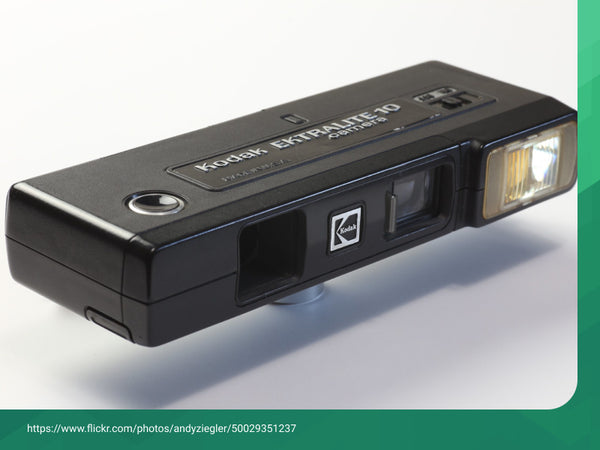
Image Source: https://www.flickr.com/photos/andyziegler/50029351237
This is the perfect first camera for 80s kids because it’s compact and reminiscent of a spy camera. It was easy to point and shoot and get a decent photo but didn’t offer anything more than simplicity and a 100% unique design. Still, the prevalence of this camera means we couldn’t have a top 20 list without it.
14. Contax RTS

Image Source: https://www.invernodreaming.com/blog/contax-rts-iii-review
Introduced in 1975, but still popular in the 80s, this camera was a great choice to bridge the gap between amateur and professional photographers because it offered adaptability to add-ons like power winders, motor drives, infrared, and radio-controlled remote releases. It is a little bulky but looks cool with a retro aesthetic collectors love.
15. Pentax P3
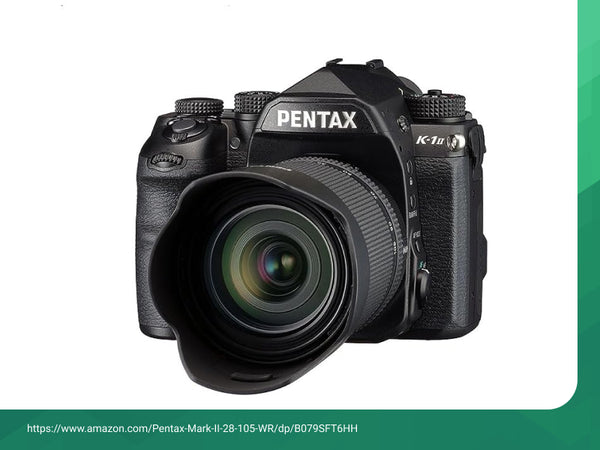
Image Source: https://www.amazon.com/Pentax-Mark-II-28-105-WR/dp/B079SFT6HH/
The Pentax P3 (or P30) is similar to the Pentax K1000 that landed in our top 10, but it has a couple of added features like Program Auto-Exposure, depth of field preview, TTL flash metering, and an electronic timer. However, it isn’t as durable and can have some mechanical failures, more than our higher-ranked option.
16. Mamiya 645 Pro

Image Source: https://kamerastore.com/products/mamiya-645-pro
This medium format camera is reliable, versatile, and offers rangefinder lenses. It’s smaller than its predecessors and works well with both short-range and longer-range photographs. However, the design is less ergonomic and uncomfortable compared with other DSLR mirrorless cameras you might be used to.
17. Rolleiflex SLX

Image Source: https://commons.wikimedia.org/wiki/File:Rollei_SLX.jpg
This camera offers some exceptional features, but also some damaging downsides. It offers auto-exposing, interchangeable lenses, very accurate metering, a rechargeable battery pack, and a precise focusing screen. On the other hand, it’s a little fragile, noisy, and drains the battery very quickly.
18. Leica M6

Image Source: https://leica-store.ph/products/leica-m6-black
This rangefinder camera has a smooth and quiet film advance and a compact camera design that fits ergonomically in the palm of your hand. The photo quality and shutter speed are standard for a 1980s camera, but it doesn’t offer extra features like aperture priority, self-timer, or double exposure lever. It may also require servicing more often due to rangefinder calibration.
19. Cosina CT-1A

Image Source: https://kamerastore.com/products/cosina-ct-1a-pentax-k
The construction of this camera isn’t great because it seems cheap and the mirror can bounce off the stops easily. Still, the easy-to-use shutter speed dial and light meter as well as the good film advance system lands it in our top 20. Plus, it has a comfortable design that simply makes it fun to use.
20. Disposable Cameras

Image Source: https://thedarkroom.com/disposable-cameras-top-cameras-reviewed-compared/
If you are wondering, “when were cameras invented that you could just throw away,” then the answer is right in the middle of the 80s in 1986. While they didn’t offer any special features, they are affordable, easy to use, and make for great memories on vacations, holidays, school trips, and more.
Conclusion
There were lots of great cameras used to capture priceless memories in the 1980s including Nikon FA and F3, Canon AE-1, and the magnificent Minolta Maxxum 7000. The 80s even brought us the first disposable cameras, popular Polaroid cameras, and the Kodak Disc Camera.
If you have film and photos captured on a 1980s camera, then you may not know what to do with it. Capture can help you convert those memories into digital copies to preserve them for future generations to enjoy, share, and cherish. Plus, we can even convert VHS and video camera memories in addition to old photographs, film, and photo albums. Click here to learn more about our film and photo digitization services!


